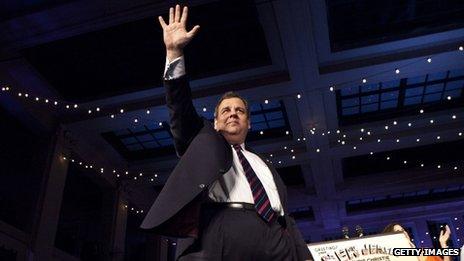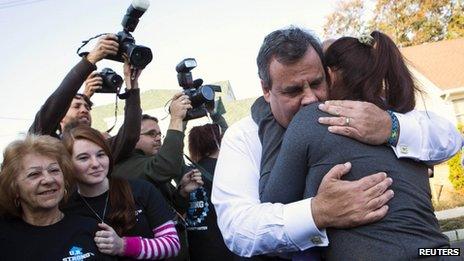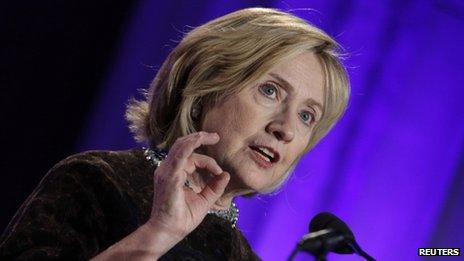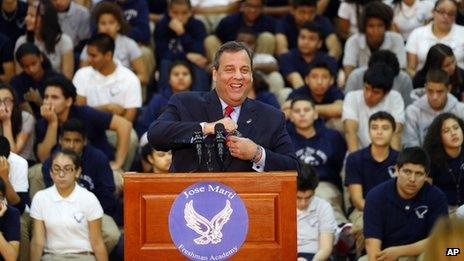Christie - the Republicans' best shot at the White House
- Published
- comments

Chris Christie was easily re-elected governor of New Jersey last week
This week's Time magazine front cover with Chris Christie, governor of New Jersey, is titled "The elephant in the room". He told ABC: "If I'm bothered by jokes about my weight, it's time for me to curl up into the foetal position and go home, OK?"
"So let's get the fat jokes out of the way first. Christie is a big figure, a heavy hitter and a weighty presence," his campaign manager and friend of 20 years Bill Palatucci tells me.
"It certainly doesn't bother anyone in New Jersey, we all have our struggles. He's got a bit of a weight problem, but it doesn't hold him down whatsoever."
What is important is the big guy's next trick, which requires all the poise of a tightrope walker, balancing on the taut wire stretching between popular appeal and conservative distaste.
Liberal vote
Make no mistake - he could be, puns aside, a huge player. He could be the Republicans' best stab at the White House in 2016, potentially transforming his party in the process.
He has, as far as I can see, a unique appeal in American politics, reaching parts that Hillary Clinton can't.
Rush Limbaugh, the hyper-conservative, Tea Party-adored doyen of right-wing talk show hosts, says it tells you all you need to know that Democrats love Christie, that he is a creation of the liberal media.
He has a point, although not the one he thinks he is making.

Chris Christie hugs a resident on the first anniversary of Hurricane Sandy
Christie's importance is precisely because a third of self-identified Democrats who voted in New Jersey vote for him. It is because liberals in the Washington media establishment can vaguely imagine holding their ideological noses and voting for him.
Hurricane Sandy defined Chris Christie - he toured his smashed-up state, throwing his big arms around the newly homeless.
He also gripped the hand of President Obama, praising him for helping the rescue operation with government money - this, just days before last year's election.
It disgusted some conservatives. He looked like a man more concerned about helping people than remaining pure to a cause.
He talks of getting the job done and working together at a time Washington can do neither, mainly because of the shenanigans of his own party.
But a lot of Americans like this sort of talk - you might even remember the senator who said there was not a liberal America, or a conservative America but the United States of America, external.
It can be the key to the White House.
Party label
There are two main ways to win elections (they are not mutually exclusive).
One, you can motivate and organise and drag out all the people who, in theory, like your party and should be voting for you. This is what Obama did in 2008 and 2012.
Second, you can hoover up the swing voters, the people in the centre and some of those who often vote for the other party.
It is a typical mistake of both politicians and journalists to talk in shorthand implying everyone is born with a party label around their necks.
It is not true. Even in the extraordinarily partisan world of US politics there are plenty of people who change from one election to another or split the ticket, voting say one way for the Senate, the other for the president.
Here's the thing - although the Democrat nomination is Hillary Clinton's for the taking, external, she can't necessarily pull off this trick.
Many Republicans heartily dislike the Clintons, and her appeal to the centre is uncertain.

Speculation abounds over whether Hillary Clinton will run for the White House
New Jersey exit polls indicated, external voters preferred Hillary Clinton by 49% to Christie's 43%. That's not bad in a long-time Democrat state.
But to get a shot at the general election, Christie has to win his own party's nomination first.
That will be really hard - in 2012, the Republican candidates tried to outdo each other by appealing to the right, and as a result Mitt Romney found himself trapped inside an ideological bubble of his own design, unable to appeal to his natural constituency of business-minded moderates.
Conservatives
Christie may be pugnacious on low taxation and the unions, but he has already evoked conservatives' ire. He will have trouble convincing them he's the real deal.
On the Sunday shows, he tried a combination of "Let's work together" and "I'm just the governor of New Jersey", but I'd expect him now to trim to the right to an extent.

Mr Christie is a popular figure in New Jersey
I asked his old friend Bill Palatucci what he made of the Tea Party criticisms.
He said: "There are lots of elements of the Tea Party. The governor has great, great support in New Jersey for cutting taxes and making government smaller. Our spending in New Jersey in 2014 is less than in 2008.
"I think the Tea Party is about freedom and smaller government and the governor is about the same things."
So he can appeal to conservatives? I ask.
"Absolutely. The governor is very much a conservative, very much pro-life, against gay marriage, worked very hard to get Mitt Romney elected.
"His accomplishments on fiscal issues when the state was on the brink of bankruptcy, turning that around - that's a record many conservatives like."
But Christie has ducked and weaved along the centre line.
He's long been anti-abortion, external, but hasn't made a big deal of it; he's opposed gay marriage but recently ordered New Jersey courts to drop an appeal against it, external; and he's banned conversion therapy for gay kids in New Jersey, external.
So I ask - will he stand for president?
Bill Palatucci laughs long and hard. "We'll wait and see," he says. "He's just got re-elected so it's important to get to the job of the second term, a good second term."
That indeed may be critical - New Jersey's economy is not in a great way.
But for the next three years, Christie will be on the tightrope - how he sways and if he falls will be vitally important for his party and the country.